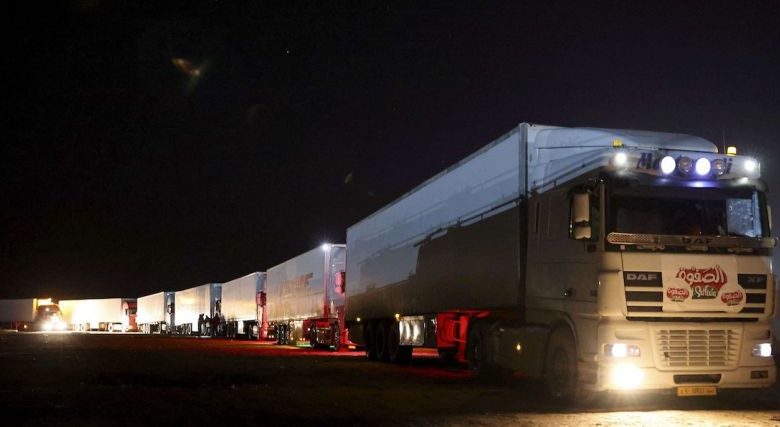Libyan food aid to Tunisia fuels political records

Libyan food aid sent by the government of national unity in Libya to Tunisia has inflamed political records. The opposition found an opportunity to attack Tunisian President Kais Saied and hold him responsible for the economic crisis and deteriorating living conditions. Meanwhile, forces opposed to the July 25 March are trying to play on social media to turn the street against Said.
This food aid does not depart from political contexts, as it comes as the head of the Libyan unity government, Abdul Hamid Dbeibeh, is looking to strengthen the regional support belt in the face of the government of his rival, Fathi Bashagha, which enjoys the support of Egypt and other countries.
The Libyan aid shipments came after a rapprochement between Tunisia and the parallel authority in western Libya, while Tunisia, which has hosted talks between Libyan factions in recent years, is caught in the Libyan crisis between the two authorities in western and eastern Libya.
In an attempt to defuse its financial crisis, Tunisia has moved to strengthen ties with western Libya due to its proximity, but the Tunisian opposition has invested this rapprochement in its confrontation with Kais Saied.
Tunisia is undergoing a serious economic and financial crisis, which has led in particular to chronic shortages of basic food products. President Saeed confirmed that the loss of these items from the market is not normal, pointing to the involvement of monopolists and their corrupt allies in order to confuse the system and incite the anger of citizens.
Opposition political figures have taken advantage of the event to challenge the government and the president’s policies, accusing him of bankrupting the country and making Tunisia a beggar-thy-neighbor, said Issam Chebbi, secretary general of the opposition Republican Party.
However, the criticism against the president is an attempt by the opposition to blame the current regime for the economic crisis for political ends, although it is linked to many factors, including the repercussions of the Russian-Ukrainian war and the COVID crisis, especially with the approach of the second round of legislative elections and the proximity of the country to the concentration of its constitutional institutions and the achievement of stability.
The Tunisian president said that the parties that ruled over the past decade and were involved in stealing billions and emptying the state coffers are not entitled to bid anymore and claim their ability to provide solutions.
The Tunisian government is counting on an IMF financing loan of $1.9 billion to enable it to meet its basic needs and clear the debts of its suppliers, thus overcoming the current crisis.
Supporters of the president say that Tunisia has helped many neighboring countries in their plight and has provided support to Algeria during the Black Decade and the war against Islamist groups. Through refugee camps on the border with Libya in 2012, Tunisia helped alleviate the suffering of the Libyan people during the civil war that led to the overthrow of Colonel Mohamad Kadhafi’s rule.
The President’s supporters recalled that Libya owes the country money and owes it, especially after Tunisian hospitals received war-wounded patients. The current aid can therefore be part of the benefits that Abdul Hamid Dbeibeh promised to redeem when he visited Tunisia at the end of November.
Besides trade, Tunisia is the first destination for people in western Libya for medical care.
“The Libyan embassy in Tunis said Tuesday that Tripoli had sent around 100 trucks loaded with sugar, oil, flour and rice to neighboring Tunisia, which is facing frequent shortages of these products.”
“These supplies are a grant from the national unity government to our sister nation Tunisia in support of the acute shortage of food commodities facing the Tunisian people,” said Naeem al-Ashabi, the embassy’s press attache.
This aid was sent in 96 trucks that arrived Tuesday morning in Tunisian territory through the Ras Jedir border crossing, he said, adding that a total of 170 trucks are expected to arrive in Tunisia carrying all Libyan aid.
Libya has provided Tunisia with significant amounts of fuel and fuel amid an energy crisis months ago, sending trucks through the Ras Jedir border crossing.
The Ras Jedir crossing is the main crossing point between western Libya and southeastern Tunisia, whose population is largely inhabited by cross-border trade, including smuggling.












